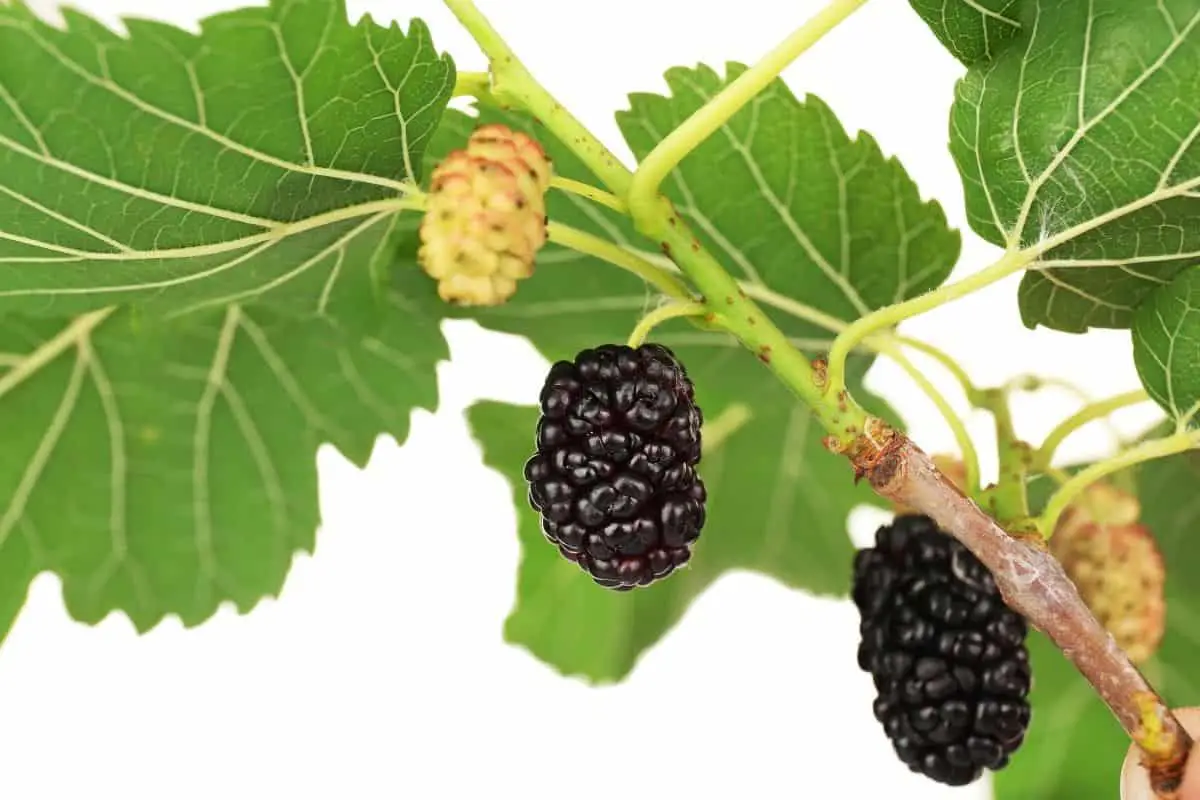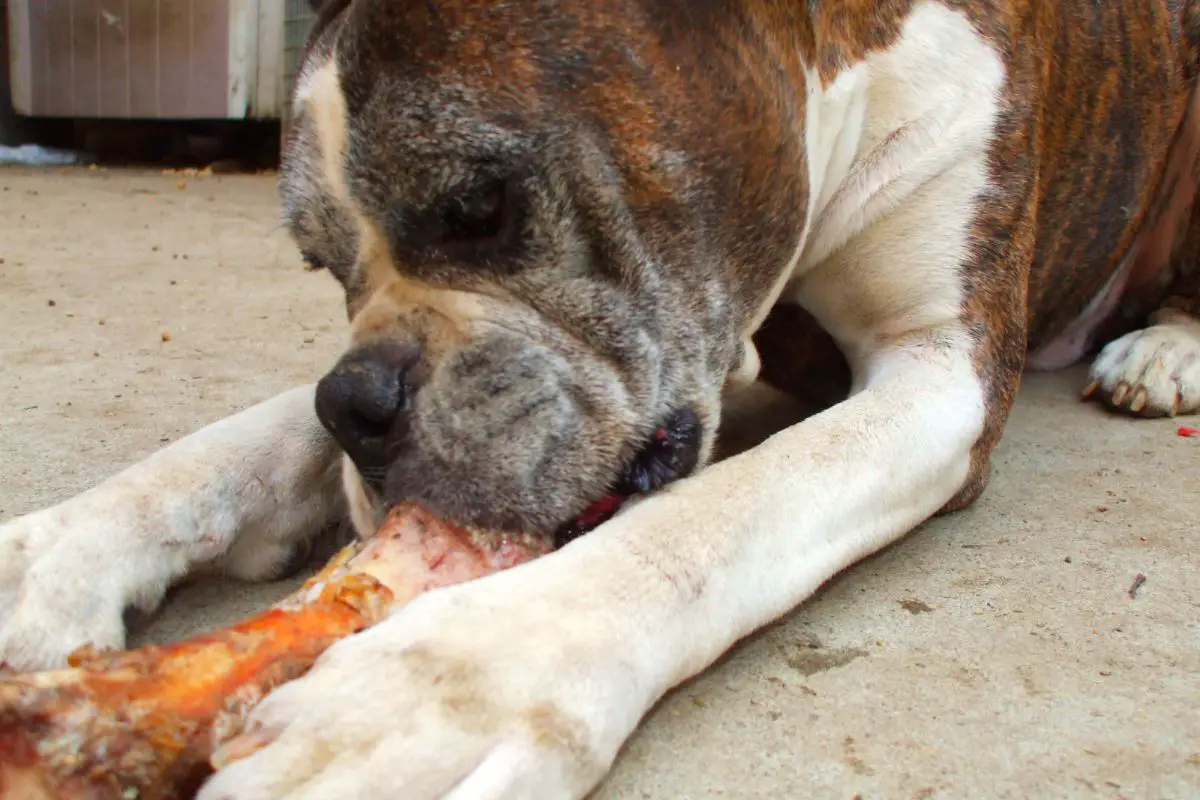This post contains affiliate links.
Mulberry trees grow wild, and there are lots of berries for the taking. Mulberries taste so good and grow all over the place, and dogs will occasionally dart to snack on them. But are they safe for your dog?
Dogs can eat mulberries as they can strengthen your dog’s immune system. However, there are conditions under which your dog should eat mulberries. Do not feed your dog unripe mulberries, and like every treat, ensure that you give them the ripe berries in moderation.
According to the American Society for the Prevention of Cruelty to Animals (ASPCA), mulberries are non-toxic to dogs, so they can snack on them from time to time. Read on to find out how beneficial mulberries are to dogs and how you can feed them to your dog in moderation.
Table of Contents
Nutritional Facts About Mulberry
This excellent fruit is packed with many nutritional benefits, whether consumed in its fresh or dried state. No wonder nature has allowed it to grow almost everywhere for us to get these dietary benefits quickly.
Fresh mulberries contain a lot of water (up to 88%). One cup (140g) of mulberries includes the following:
- 60kcal Energy
- 13.7g Carbohydrates
- 2.02g Protein
- 0.5g Fat
- 2.38g Fiber
Dried mulberries have less water content with higher and more concentrated amounts of these other nutrients; 70% carbohydrates, 12% protein, 3% fat, 14% fiber.
However, mulberries may not be as nutritious as other foods, as one cup offers the following nutrition:
- 51 mg Vitamin C
- 10.9 mcg Vitamin K
- 2.6 mg Iron
- 272 mg Potassium
- 0.1 mg Riboflavin
- 1.2 mg Vitamin E
- 25.2 mg Magnesium
- 53.2 mg Phosphorus
- 54.6 mg Calcium
Why Should You Feed Your Dog Mulberries?
Dogs will eat almost anything, especially when it smells good. Mulberries are common in the United States, and your dog might have come across a fair share of them while roaming about.
The good news, however, is that mulberries are packed with loads and loads of nutrients and health benefits for your dog. Some of the most common contents of mulberries include vitamins A, vitamin B6, vitamin C, calcium, iron, potassium, and trace amounts of other minerals, folic acid, and choline.
Are you still wondering what benefits mulberries bring to your dog? Let’s review some of them below.
Promotes Blood Circulation
Blood carries oxygen to every part of the body, while the red blood cells increase blood circulation all over the body.
Iron improves the production of red blood cells, and mulberries have a very high iron content. So when your dog eats mulberries, the iron content increases the production of red blood cells to carry oxygen to cells and muscles, thereby energizing your dog.
Strengthen Immune System
White blood cells provide immunity against many diseases, and mulberries have alkaloids found in white blood cells. In addition, mulberries are also packed with vitamin C, which provides antibodies to fight against diseases like viruses, or dog cancer.
Prevents Blood Clots
Veins and arteries move blood to and from the heart to different parts of the body. Mulberries have antithrombotic properties from antioxidants and polyphenols, which prevent blood clots in the veins and arteries that transport blood to cells. Your dog, when eating mulberries, is then protected from cardiovascular diseases.
Improve Cardiovascular Health
Mulberries are high in iron content. They are rich in antioxidants, and flavonoids which improve the function of blood vessels and help to fight heart disease in dogs. Iron also provides oxygen to your dog’s muscles, which can help fuel those daily runs you and your dog love to take. It can also help keep hormones healthy.
Improve Brain Health
The high levels of flavonoids in mulberries make them great for improving the brain health of your dog, as well as reduce the occurrence of cognitive decline that leads to brain disorders and diseases. A daily serving of mulberries for your dog can help keep his brain healthy and sharp.
Slows Down Aging
Mulberries contain antioxidants that increase longevity by blocking the oxidative process from free radicals that accelerate aging.
Free radicals are produced as a by-product of metabolism. If not balanced, these free radicals can alter the operation of protein and DNA, which can trigger many diseases. Mulberries contain a significant number of antioxidants that balance the activities of free radicals and improve your dog’s health.
Improves Digestive Health
The high fiber content in mulberries enables smooth digestion and improves digestive health. Fiber aids your dog’s bowel movement by softening and increasing the stool’s weight and size, making it bulky and reducing the chances of constipation.
On the other hand, fiber also helps to solidify watery stools by absorbing water from the stool, making it bulky.
Production of Strong Bones
Getting enough calcium and vitamin D will aid the production of strong bones in smaller dogs while strengthening bones in older dogs. Mulberries are loaded with calcium, vitamin D, vitamin k, iron, and trace amounts of magnesium and phosphorus essential for producing solid bones.
Antitumor and Protection Against Dog Cancer
Mulberries have anthocyanin with chemoprotective properties, protecting dog tissue from damage caused by cancer therapy agents and preventing tumor formation. They also contain antioxidant and anti-inflammatory properties for added benefits.
How To Serve Mulberry to Your Dog
Like most foods, serving your dog mulberry can be a little tricky. In this case, we recommend giving them just a handful of ripe mulberries fresh from the tree. White mulberries are beneficial, serving them in excess can have side effects.
Therefore, experts often advise that you avoid overdoing it.
What To Avoid When Serving Your Dog Mulberries
While you want to give your dog a nice treat, there are things you should keep in mind before serving him mulberries. You don’t want to give him unripe berries or bake them into treats. You also need to avoid giving him dried mulberries.
Let’s take a closer look at these reasons:
- Avoid giving your dog unripe or fermented mulberries. Unripe mulberries cause stomach upset, often leading to digestive problems. They are also known to cause hallucinations in humans and dogs, while fermented mulberries (from staying on the ground too long) can make your dog dizzy or drunk.
- Avoid baking mulberries into treats. Heat breaks down the chemical composition of nutrients in mulberries and strips them of their benefits. Baking mulberries into treats will also lead to your dog consuming more than needed, which can lead to obesity.
- Avoid feeding dried mulberries. Although dried mulberries have unusually high protein content, they contain less water, and the sugar content is more concentrated. In this form, mulberries will pose health challenges to your dog when consumed.
How To Prevent Your Dog From Overeating Mulberries
If you live in the United States, you can tell how popular mulberries are, as their trees are spread all around different states. You will usually see them lining up the pavement on the streets, or you could even have a tree in your yard. In this case, it becomes difficult to prevent your dog from gobbling these berries up or ascertaining the number of berries eaten.
You might want to take the following precautions to limit the number of mulberries your canine friend will be exposed to.
- If you have a mulberry tree in your yard or garden, make sure to regularly pick them up from the ground when they fall to reduce their numbers and stop them from fermenting as a result of staying too long on the ground.
- In cases where you are going on a walk with your dog, ensure you tighten the leash to stop him from bolting and gobbling up the berries lining the pavement or streets.
Can Dogs Eat Mulberry Leaves?
Several studies have shown that mulberry leaves contain medicinal properties and are used to prevent throat infections, skin irritation, and joint inflammations. However, as much as this is beneficial, and although mulberry leaves are not toxic to dogs, too many leaves can irritate your dog’s stomach and lead to digestive problems.
If your dog must eat these leaves, let them eat just a few at a time. Just remember that too much of it can cause side effects.
Can Dogs Eat White Mulberries?
White mulberries are native to China, although they can be found in some parts of North America. The white mulberry tree produces white or slightly green berries and is safe for your dog to consume. But, as usual, it should be consumed in moderation, like every other dog snack.
Can Dogs Eat Red Mulberries?
The red mulberry tree grows across the United States, which is found easily and lines the east and south coast as well as many other states. Red mulberries are of great health benefits to your dog and should be eaten in moderation.
Can Dogs Eat Black Mulberries?
Black mulberries, which are found in Western Asia, have been consumed for decades. In addition, the twigs, roots, and barks of black mulberries have been used for medicinal purposes. For example, constipation and runny noses can be cured with black mulberry roots. The tree produces black mulberries, which are safe for your dog.
Avoid These Toxic Berries for Your Dog
Many other berries grow easily across the United States, but some of them can be toxic and dangerous to dogs. They are potentially harmful to your dog and could lead to vomiting, seizures, difficulty breathing, diarrhea, and drooling.
You must pay attention to these berries and take the necessary precautions to prevent your dog from eating them.
Some precautions that you can take include leashing your dog when you are out on a walk and picking them from the ground if they grow in your yard. These might include the following:
- Gooseberries
- Mistletoe berries
- Baneberries
- Dogwood berries
- Pokeberries
- Holly berries
- Salmonberries
- Juniper berries
Conclusion
Ripe mulberries are safe for your dog to eat in moderation, as they provide many health benefits such as:
- Solid bones
- Excellent digestive health
- Slow aging
- Cardiovascular health
- Brain development
- Protection against cancer
Too many mulberries, however, will cause digestive issues for your furry friend. Also, eating unripe mulberries will cause stomach irritation and hallucinations.
Found all over the United States, mulberries line the streets and pavements as well as our yards, making them available for your dogs to eat in huge quantities. Take precautions when you go out on walks to stop your dog from consuming too much.
Related Articles
- Can Dogs Eat Jello? (We Find Out)
- Can Dogs Eat Lemongrass? Let’s Find Out!
- Can Dogs Eat Mayo? (We Find Out)
- Can Dogs Eat Raspberries? Let’s Find Out!
- Can Dogs Eat Frozen Yogurt? Read This First!
Sources
- ASPCA: Mulberry Trees
- US Department of Agriculture: Food Data
- Taylor & Francis Online: Testing various fruits for anti-thrombotic effect
- ResearchGate: Antioxidant and Hemolysis Protective Effects of Polyphenol-Rich Extract from Mulberry Fruits
- WebMD: Black Mulberry
- Dr. Axe: Mulberry: The Fruit That Protects Your Heart and Liver
Mrdogfood.com is a participant in the Amazon Services LLC Associates Program, an affiliate advertising program designed to provide a means for sites to earn advertising fees by advertising and linking to Amazon.com. We also participate in other affiliate programs which compensate us for referring traffic.





